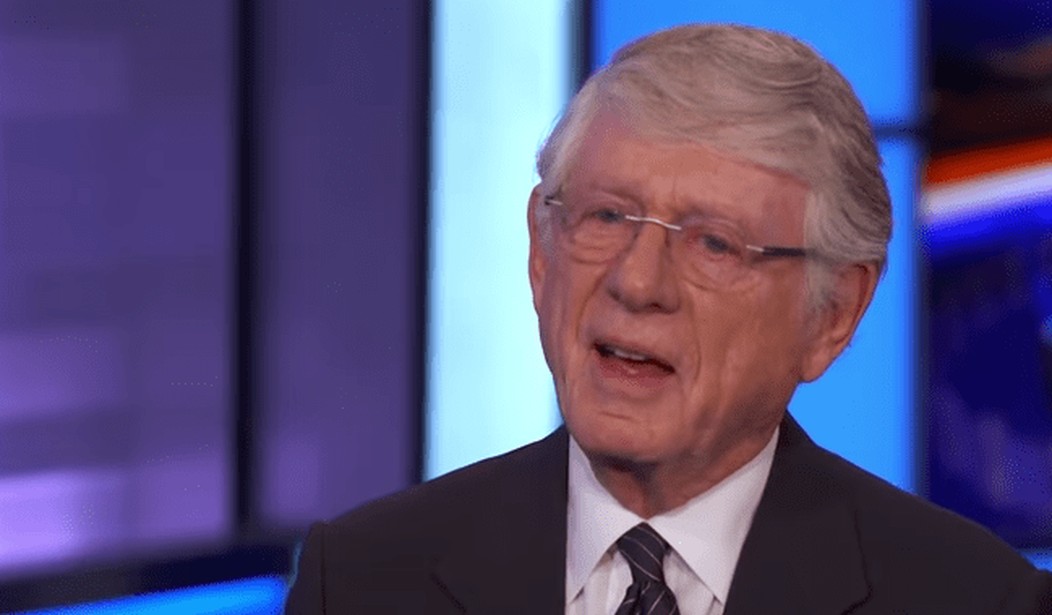Why can’t we all just get along? Why are we at each other’s throats in the political arena? Why so much partisan rancor? Why so much anger, hatred, and vile epithets tossed around social media? Why do we always have to be so divisive? Why can’t we be one big happy American family, holding hands and singing Kumbaya?
These were the questions implied by Ted Koppel’s provocative segment for “CBS Sunday Morning” last weekend, mulling over “a polarized America.” Koppel and CBS had a sense of what divides us, and a prescription for a better America.
Koppel: Increasingly, we Americans occupy alternate universes…
There is very little common ground left, only battling perceptions of reality…
Neither side seems to have much use for the other, and — in this age of the internet and cable TV — very little is out of bounds…
There are legions driving the country further and further apart…
A Pew study finds 81% of voters say they cannot agree with the other side on basic facts.
That’s obviously a problem. If we cannot agree on basic facts, any effort to meaningfully address social problems will be thwarted.
However, the unspoken premise of Koppel’s analysis is that one side of the political spectrum has the “facts” while the other does not. Judging by where Koppel chooses to focus his attention, he clearly has a strong opinion as to which side is which. The segment includes a smattering of clips from lefties like Stephen Colbert and John Oliver in an attempt to feign balance. But the focus of criticism rests on conservative media.
Koppel and his guests reflect upon the good old days when the “facts” were dispensed by a few authoritative newscasts.
Koppel: There’s nothing new about simmering hostility between a president and the press…
Norm Ornstein, a resident scholar at the American Enterprise Institute, was [in the time of Nixon’s presidency], and remains now, a student of our political system and our media.
Ornstein: We would watch network news shows, and we would sit there and we would have basically a common set of facts that would emerge from them. As we’ve moved to the new media world, the more we’ve got this cacophony of voices, the more you cut through it by basically shock value. And that’s why people now are driven not by their own attachment to their own parties. They’re driven by a hatred for those on the other side.
Ah, yes, the good old days when “facts” were spoon-fed to a docile populace by a handful of government-approved outlets. Ornstein implies that our public discourse was much better back when there were fewer people in the spotlight, particularly when those who occupied that spotlight were credentialed, licensed, and otherwise granted an institutional seal of approval.
A more sinister implication emerges as the segment continues, suggesting that all these “shock value” voices ought to be silenced — if not completely, then certainly to some degree. Koppel and Ornstein expound.
Koppel: Rush [Limbaugh] had a lot to do with creating … two separate worlds [of political perception]. But he couldn’t have done it until 1987, when the Federal Communications Commission did away the so-called Fairness Doctrine.
Ornstein: The Fairness Doctrine basically said that people on radio and television, if they presented one political point of view, had to balance it with the opposite political point of view…
Koppel: Free of the Fairness Doctrine, Rush Limbaugh and conservative talk radio exploded into a political force of nature.
Ornstein: Now you take conservative talk radio, move that forward to tribal cable television, and then layer on to it email and social media, and all of a sudden we live in a world where people can get information and believe it’s absolutely true and not have to get any kind of opposing point of view. And once they believe it, they will always believe it, even if it’s utterly false.
So the prescription here is — surprise, surprise — more government control. In this case, Koppel and Ornstein prescribe a blatant violation of your First Amendment freedom of speech. This is, ironically, the true answer to why we can’t all get along. In this segment, Ted Koppel and CBS promote the idea that it is proper to initiate force to advance government-approved speech. There is no other way to characterize the Fairness Doctrine. Under it, government mandates that media venues give up their platform to speech they would not otherwise support.
The whole idea that political perspectives ought to be “balanced” by their opposite presupposes some standard by which that may be judged, which is complete nonsense. How do you find somebody to balance Rush? How do you determine that? By whose standard? Who gets to decide what speech requires a response, and how much is warranted? If Koppel’s answer is government, then — I hate to break it to him — he may be an anti-free speech fascist.
There’s no obfuscating this point. Those who advance the Fairness Doctrine are declared enemies of freedom. Their aggression — not our free speech — causes the polarization we see in our political discourse. That’s what makes this rant by Koppel so absurd. He’s prescribing the oppression of his political opponents, then has the audacity to ask, “Why can’t we all just get along?” We can’t get along because one-half of the country is trying to enslave the other.
Donald Trump proves absolutely right regarding how awful the media is, negligent and completely inadequate to their task of seeking and presenting truth. Ted Koppel recognizes that “fake news” perception, but he and New York Times executive editor Dean Baquet dismiss it.
Koppel: If I were a Donald Trump supporter, I’d be seething everyday. I’d say these guys [in the media] are out to do him in, and one way or another it’s gonna be us or them.
Baquet: I think my job is to ask hard questions about the largest revolution in government we’ve seen in my lifetime as a journalist, not to attack [Trump], but to ask really hard questions about him, and also to ask hard questions of a completely new cast of government officials who we know very little about. I think, if we don’t do that — meaning the press, I don’t think anyone else will.
Nobody believes the media when they posture like this, pretending that they’re actually in the business of asking the hard questions and getting at the truth.
I’m old enough to remember nine years ago when Barack Obama ran for president as someone the nation knew far less about than we do about Donald Trump. I seem to recall that questioning Obama’s background then, questioning his connections, questioning where he attended church and what was taught there, questioning his upbringing and the ideology of his parents and mentors, questioning his education, and questioning the outright communism and radical terrorism of many of his closest associates was completely out of bounds both during his campaign for president and throughout his tenure in the White House. Glenn Beck catapulted from relative obscurity to one of the lynchpin personalities in conservative media, specifically because he was willing to do what the mainstream media refused to do — actually vet Barack Obama and his allies. So this newfound sense of urgency, this newly discovered affinity for investigative journalism and probing questions, comes off as wholly disingenuous garbage. Nobody believes it.
That’s why the fake news meme has won the day. It’s a large contributing factor to why Donald Trump is president. Koppel and his buddies in the media brought this on themselves. There is no journalistic media anymore, only perspectives. Whether Banquet wants to confess it or not, The New York Times has one. Their biggest problem, and the problem with all mainstream media nowadays, is that they refuse to acknowledge their bias. They don’t even see it. They honestly believe that they are objective, fair, and reasonable. That delusional mindset enables garbage like this Ted Koppel segment, offered without the slightest sense of irony or shame. To their mind, they really are the defenders of truth and wisdom, guarding civilized society from the likes of Sean Hannity, Rush Limbaugh, and conservatives like you and me.
They don’t get it. You know why they don’t get it? For the same reason that a little boy who tries to keep a pet frog doesn’t understand when the frog either escapes or dies. The frog doesn’t need the little boy to take care of him, and so it is with us. We don’t need to be protected and cared for by the media elite, or the academic elite, or the political class. We don’t need to be kept like pets. We need to be free. That’s it. That is the totality of our need in so far as government and other institutions are concerned. Preserve our liberty, and otherwise leave us alone. That’s what Koppel doesn’t understand. It’s what none of these stuffed shirts understand. They have more in common with the Capitol dwellers in The Hunger Games than they have with you or me and they stand wholly incapable of understanding why we rebel.
It’s needs to be said here that our political divide didn’t begin in the age of Trump. But, it has evolved. Last spring, in June of 2016, a Pew study discovered that 49% of Republicans and 55% of Democrats say they are afraid — yes, afraid — of the other party.
As President Trump might say, sad.
Yes, it is sad, but not for the reason Koppel thinks. It’s sad because many of us have just cause to be afraid. It’s sad that one-half of the country is hell bent on enslaving the other half. It’s sad that liberty has no place in mainstream discourse. It’s sad that the concept of freedom proves so alien to the likes of Ted Koppel, that he doesn’t even think to account for it in his analysis.
If you want peace, if you want benevolence, if you want everyone to just get along, there is only one path to that end. Freedom. That’s it. That’s the only way you get there. You can’t have peace and civility in a context where one group is hell bent on clubbing the other over the head and taking their stuff.








Join the conversation as a VIP Member